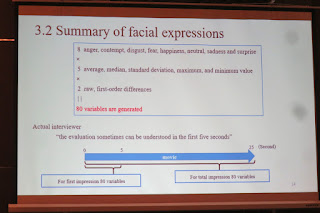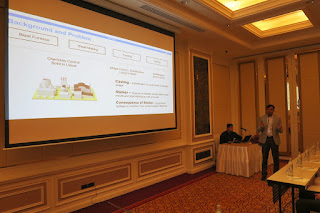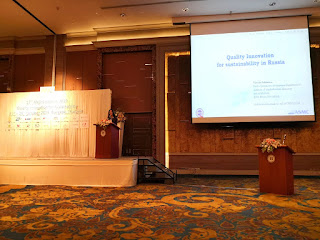Asian Network for Quality (ANQ) Congress 2019 was held
by Standard and Quality Association of Thailand (SQAT) in The Berkeley Hotel, Bangkok,
Thailand from 21-25 Oct 2019. The congress theme was “Quality Innovation for
Sustainability”. Day 2 of Congress was
held on 24th Oct 2019. In the beginning, Minda and I took a photo
with Dr. Pramual
Suteecharuwat (Assistant Professor, Department of Industrial Engineering,
Faculty of Engineering, Chulalongkorn University, Thailand) in front of the ANQ
flag which made by her.
We also took a photo
with Ms. Larisa Fedyk (Head of the Central Organ the System, Federal Agency on
Technical Regulating and Metrology System of Voluntary Certification) and Mr.
Igor Pundel (Chairman of the Board of Directors the Systems, Federal Agency on
Technical Regulating and Metrology System of Voluntary Certification).
The first session I
attended was “Quality Management” and the first speaker was Dr. Ngo Van Nhon
(VQAH; Institute for Quality Assessment Development (IQAD)) and his
presentation topic entitled “ISO 21001: A New Management System Standard for
Educational Organizations (EOMS) – Studying and Implementation”. The new standard was more socially
responsible for offering educational services.
The ISO 21001:2018 standard
provided a great basis for education providers to enhance the quality of their
products and services. Then Dr. Ngo introduced the framework of EOMS and he
believed that if the standard was implemented, and complemented with best
practices in the field of education, it would help organizations yield positive
results for its beneficiaries – be it students, parents, community and
interested parties.
The second speaker was Mr.
Johnson Tan Swan San (Honorary Treasurer & Exco member, SQI) and his topic
named “Enhancement of a Laboratory Management System via Application and
Integration of Risk Management into ISO/IEC 17025:2017”. Firstly,
he briefed the requirements of the new version of ISO/IEC 17025:2017.
After DMAIC six sigma
process, Mr. Too achieved the target that cost reduction upto 16%. During Q&A, someone asked why used three
factors but only two factors during analysis phase. Mr. Too said because of time limitation and
constraint in the business world.
The third speaker was
Dr. Catherine Y.P. Chan and her presentation named “Quality Function Deployment
(QFD) Fosters Innovation”. She said in
order to endure existence in the market, enterprises had tried every mean to
seek for new products and services. So
that Innovation was key for sustainability in the long run.
Then Dr. Catherine Chan
briefed discussing methods for collecting VOC such as video recording,
visiting, etc. Since advancement of
Technology & Information Technology, she asked us to consider new media,
channels, methods and tools which could assist and support us on interacting
customers and acquiring a thoroughly understanding with needs.
Finally, Dr. Chan
introduced how QFD fostered innovation and she believed positive power
generated from the QFD process which would develop innovation naturally and
continuously.
The last speaker in this
session was Mr. DurgalPrasad (DP) Muthukrishnan (Director Consulting,
Cognizant) and his topic was “Enhancing Customer Experience (CX) in Digital
World through Quality Architecture”. Firstly,
he introduced Congizant which established in 1994 and to be NASDAQ since
1998. Then he addressed change of
Quality role through world class Quality Architecture.
And then Mr. DP
explained world class Quality Architecture solution evolved to address:
-
Product
quality improvement in line with ISO standards
-
Influence
business growth/outcome
He also explained the Quality
Architecture that product quality characteristics profiled based on the
business context and the economic benefits.
Finally, he explained 5
steps approach to setting up Quality Architecture Framework below.
1.
Customer
Experience Scanning (CX Scanning)
2.
Diagnostic
Study
3.
Analyse
and Benchmark
4.
Define
and Measure
5.
Improve
I met Dr. Takeshi Kaneko
in the venue and took a photo for memory.
After end of this
session, I went to the other session “Quality of Life”. Ms. Larisa Fedyk (Head of the Central Organ
the System, Federal Agency on Technical Regulating and Metrology System of
Voluntary Certification) was the last speaker and her topic named “All-Russian
Register - Projection into the future quality of life”.
Firstly, Ms. Larisa Fedyk presented All-Russian Register contribution and her presentation of ANQ award such as medical organization in the Nizhnevartovsk city polyclinic Nizhnevartovsk and different paper presentation in the field of health care such as lean medical production, etc. She also briefed their project named “Zemsky Doctor” and “Good to the Village” implemented in the Khanty-Mansi Autonomous District of Yugrap and presented in ANQ Congress 2018. Then she introduced different implementation project implemented in Center for Diagnostics and Cardiovascular Surgery (Surgut), Soviet District Hospital, Surgut Clinical Perinatal Center, Surgut District Clinical Hospital, Center for Professional Pathology, etc.
All speakers took a
group photo.
Then I took a photo with
Russian team - Ms. Larisa Fedyk, Mr. Mr. Igor Pundel and their interpreter.
During the tea break, I
took a photo with Prof. Satoko Tsuru (Professor, Healthcare Social System
Engineering Laboratory, School of Engineering, The University of Tokyo).
I also meet Japanese
friends included Dr. Masaaki Kaneko (Associate Professor, Tokai University),
Mr. Janak Mehta, Prof.
Yoshimichi Watanabe (Professor, Division of Engineering, Graduate School
Department of Interdisciplinary Research, University of Yamanashi, Japan), and
Mrs.
I also took photo with
Mr. Janak Mehta in front of the ANQ flag.
After that I attended
the session “Quality Innovation” for HKSQ member presentation.
When I arrived, the
speaker was Dr. Lien Nguyen thi Hoang (VQAH) and her presentation topic named
“Choosing a Networking Model of Laboratory Collaboration for Analysis Services
in Vietnam”. Dr. Lien said “When the free trade agreements that Vietnam signed
are effective, the control of goods through technical barriers will be more
focused, because the demand for testing and verifying the quality of goods is
growing.” Therefore, she proposed a
model provided networking foundation to member-laboratories on the basis of
strengthening their weak capacity and failure in order to meet the demand of
market.
Then she introduced
their research methodology in three phases.
After that she
demonstrated the preliminary survey results of the entire laboratory in
Vietnam. There were more than 900
laboratories in which only 165 laboratories were accredited by the Office of
Accreditation.
There were
two findings and the first one was summary of problems of the laboratory system
below.
-
Equipment
is not synchronized, has not invested equally and characteristics
-
There
is no mechanism to transfer research results in the field of testing
-
Lack
of technical support services (repair, supply of standards, equipment
calibration ...)
-
Lack
of information on testing capacity and legality of test results;
-
Laboratory
management capacity is limited and lack of professionalism
-
Performance
of equipment is not high
-
Most
research activities focus on basic research, few application products and
connect with industries
The second finding was to propose models of cooperative connection
system models and connection criteria.
Dr. Ivan C. Ng (City
University of Hong Kong) was the fourth speaker in this session and his topic
named “The Role of Corporate Culture in China’s 21 Century Industrialization:
An Investigation in Eastern China”. Firstly,
Dr. Ng introduced significant economic development in China in the first 15
years of the 21 century and 10 cluster industries of China’s Industry 4.0.
Then Dr. Ivan Ng briefed
his research workshop for different types of Chinese cultures such as
Paternalistic Leadership Culture (TC1), Artisan Spirit (TC2), Chinese Traditional
Thinking Culture (TC3), Work Attitude of “Just About Right” (差不多) (TC4), etc.
And then he demonstrated
his research framework – Study Model to find the relationship among Traditional
Culture (TC), Chinese Contemporary Culture (CC) and Critical Success Factors
(CSF).
Dr. Ng’s initial results
were showed as follows:
-
Enterprises
is to promote paternalistic culture in advancing of industrialization
-
Focus
on manufacturing and technology-intensive industries for industrialization
-
Decision
for industrialization are to consider artisan spirit
-
Organization
culture dimensions facilitate implementation for industrialization.
After that I went to the
session “Quality Management” and found that Dr. Tuan-Ho Le (Department of
Industrial & Management System Engineering, Dong-A University) presented
his paper named “Parameter estimation and optimization methodologies:
Artificial Neural Network modelling perspectives”. During Q&A, Dr. Le said it could be used
in Drug development.
The next speaker was Mr.
Yebeom Kim (Department of Industrial and Management Engineering, Inje
University) and his topic was “Applying the SERVQUAL and Kano model for
evaluating Service Quality in Fitness Industry”. Firstly, Mr. Kim proposed using the Kano-SERVQUAL
integrated approach to more accurately assess the quality of service in the
fitness industry.
The overall framework
with four stages were demonstrated.
In the detailed
procedure, one question was filled out with 2 SERVQUAL + 2 Kano = 4
questions. It needed to separate into
two sessions for analysis that one is for KANQ analysis and the other was
SERVQUAL analysis. Finally, he had 130
respondents for 22 items of fitness facility.
The last session I joined
in the morning was “Quality Management”.
The last speaker was Mr. Takaya Yamauchi (Department of Industrial
Administration, Tokyo University of Science) and his presentation topic entitled
“Recruitment Assistant Method using Video Interview”. His
study was focused on quality of hiring which was often performed based on each
interviewer.
Then Mr. Yamauchi
explained the background of vicious circle.
Finally, he showed how
to measure facial expression using Microsoft Azure Face API that could
recognize eight expression included anger, contempt, disgust, fear, happiness, neutral,
sadness and surprise. Overall, it had generated
80 variables. Mr. Yamauchi introduced a
method of rating the interviewer's evaluation ability using the item response
theory (IRT) generalized partial scoring model used for estimating an
examination.
During lunch break, I
met Prof. Suzuki Tomomichi (Japan).
I also met Bangladesh
friends Mr. A.M.M. Khairul Bashar (President, Bangladesh Society for Total
Quality Management (BSTQM)) (middle) and Mr. Md. Nurul Haque (Principal
(Retired), Government Polytechnic Institute; BSTQM) (left).
In afternoon parallel
session “Quality Process”, the first speaker was Mr. Ranjay Kumar Singh (Head
Process Slab Casting, Tata Steel Ltd.) and his presentation named “Sticker
Pattern Recognition – The use of advanced analytics on engineered features to
detect sticker breakout in continuous casters”.
Firstly, he introduced the background and problem of Casting, Sticker
and Consequence of Sticker. The process included Blast Furnace, Steel Making,
Casting and Rolling.
Then he introduced the
sticker detection and recovery as well as its past algorithm. After that he introduced new approach such as
use of 3 year history of available patterns and merging data science and
physical reality of sticker, etc.
Finally, Mr. Singh
concluded his project timeline and scaling up plan after successfully achieved
75% reduction in false alarm and saving 1.2 million in reduction of quality downgrading
cost.
After Mr. Ranjay Kumar Singh
presentation, we took a photo with his friends for memory.
(Left: I, Mr. Ranjay Kumar Singh, Mr. Avinash
Kumar and Mr. Kartar Singh)
The last speaker in this
session was Dr. Mong Ka Fai, Alan (Deputy Project Manager, China Communications
Construction) and his presentation topic entitled “New Mechanically Automatic
Inclinometer System”. Dr. Mong
introduced Hong Kong reclamation and introduced inclinometer was one of major
equipment to measure the land deformation which was a common phenomenon in land
reclamation.
Then Dr. Mong compared
the conventional manual inclinometer and new mechanically automatic
inclinometer system. He identified
several advantages such as high efficiency, few human resource and higher level
of precision, etc.
The whole system and
data acquisition and transmission were explained in the following diagram. And then he briefed his research hypotheses
below.
RQ1. Is the mechanically
automatic system accurate than the manual system in measuring horizontal
displacement?
RQ2. Can the
mechanically automatic system be cheaper than the manual system in one-off
set-up and incurring cost?
RQ3. Can the
mechanically automatic system improve site safety by preventing injuries and
deaths than the manual system?
Lastly, Dr. Mong
concluded his results were positive that the mechanically automatic system
performed better than the traditional system in terms of measurement accuracy,
work efficiency, lower labour costs and lower risk of safety concerns.
Then Dr. Alan Mong
received certificate and took a photo with his wife for memory.
After that I took a
photo with all Postdoc participants from Hong Kong.
(Left: I, Dr. Keith Kwok-keung Wong (Deputy
Chair – The Chartered Institute of Plumbing and Heating Engineering), Dr. Alan
K.F. Mong (Deputy Project Manager, China Communications Construction) and Dr.
Lam Kong Ngan Kenny (Founding President, Shenzhen-Hong Kong Institute of
Professional Management Association))
In the Panel Session, we
were well prepared to learn from the coming keynote speakers.
Our Singapore friend Mr.
Kitson Leonard Lee chaired this session.
The first
keynote speaker was Prof. Ching-Chow Yang (President, CSQ) and his presentation
topic entitled “Quality 、Innovation
and Sustainability”. Firstly,
Prof. Yang briefed the changes from quality concept to sustainability from 1900
to 2000 in which had different stages from Product standard (1900) to Product
quality (1930), to Customer-focused (1970), to Innovative quality (1990) and
then to Sustainability (2000).
Then Prof. Yang introduced
the framework of innovation system of TSMC.
He said TSMC established in 1987 and headhquartered in Hsinchu Science
Park, Taiwan. TSMC pioneered the
innovative pure-play foundry business model by focusing solely on manufacturing
customers’ semiconductor product. TSMC focused on four perspectives and they
were Best Quality, Customer Service, Innovation-focused and Sustainable
Products.
After that Prof. Yang
mentioned the progress of green system in TSMC from code compliance to
voluntary carbon reduction.
Finally, Prof. Yang
briefed TSMC CSR award achievement and their sustainability implementation involved
Risk Management, Social Responsibility and Green that achieved different green
related management system standards.
The second keynote
speaker was Ms. Victoria Yakimova (Head of perspective development, Department
of Academy of Standardization, Metrology and Certification, ROQ, Russia,
Novosibirsk) and her topic named “Quality Innovation for Sustainability in
Russia”. Firstly, she introduced that
Russia had 1/8 of the land in the world with 11 time zones.
Then she mentioned their
President formed strategy of scientific and technical development of Russia
that “Sustainable, Dynamic and Balanced Development of Russia for the next 10
years.” They had 9 national goals for
priority national projects.
Finally, Ms. Victoria
Yakimova introduced the award of the Government of the Russian Federation that award model was harmonized with EFQM
award for excellence. The competition established
in 1998 and separated into four nominations including Quality Leader, The Pride
of the Fatherland, Innovation and Import Substitution.
The last keynote speaker
was Dr. Ladawan Krasachol (Executive Vice President, National Science and
Technology Development Agency) and her presentation title named “Quality
Innovation - National Science and Technology Development Agency”.
In the beginning, Dr. Krasachol briefed the Quality Roadmap in Thailand from 1969 to 2003. The Quality Control Association was established in 1977 and Thai Standards Association (TSA) was founded in 1981. They combined to be The Standards & Quality Association of Thailand (SQAT) in 2001 and SQAT is ANQ Board Member. In 2000, Thailand started their TQM journey.
Then she introduced
their role of Research Organization to create/discover new knowledge and
applying it to provide solutions. Such
knowledge would extend to create innovation.
And then she briefed their Total Quality Concept.
After that Dr. Krasachol
stated to apply Quality Excellence Criteria for excellence practices in NSTDA
from Research to Innovation, from ideas to utilization.
Lastly, she concluded
that they expected to connect R&D to Economic Impact for Thailand 4.0. “Quality is a momentum to Thailand
Sustainability” she said at the end.
I presented HKSQ 30th
anniversary book and highlight to Dr. Ladawan Krasachol and took a photo for
memory.
After the panel session,
Dr. Panisuan Jamnarnwej (Chairman, ANQ; President, SQAT) presented souvenirs to
all keynote speakers and session chair.
And then Dr. Pansiuan
presented the ANQ Recognition for Excellence in Quality Practice (ARE-QP)
awards and took a group photo of winners.
Prof. Thanakom
Soontarnchainacksaeng (SQAT) reported the ANQ 2019 information and announced
the Best Paper Award.
Totally, ANQ Congress 2019
had 245 participants with 138 papers.
20 papers selected as
the best papers.
Hong Kong had two
winners and they were Dr. Mong Ka Fai, Alan
and Dr. Raymond W.L. Chan. (Since
Dr. Raymond Chan had business meeting in this afternoon, Dr. Keith Kwok-keung
Wong represented him to get the award.)
Singapore had one winner
and our good friend Mr. Too Meng Ken achieved it.
The ANQ Congress 2020
would be held in Korea. Prof. Matthew
Minsuk Shin (Korea) introduced the venue of Congress which held in Korea
Chamber of Commerce and Industry (KCCI) Grand Hall (http://english.korcham.net)
Finally, Dr. Panisuan
Jamnarnwej transferred the ANQ flag to Prof. Wan Sean Shin (Former
President – Korean Society for Quality Management).
At the end, Prof. Phulporn
Saengbangpla (Honorary Advisor, SQAT) gave closing remarks and gave special appreciation
to the only staff in SQAT.
Reference:
Asian Network for
Quality (ANQ) - http://www.anforq.org/
ANQ 2019 - http://www.anq2019.org/
20191022: Pre-ANQ
Congress 2019 visit to University in Songkla, Thailand and Congress Registration
- https://qualityalchemist.blogspot.com/2019/10/pre-anq-congress-2019-visit-to.html
20191023: ANQ Congress
2019 in Bangkok, Thailand – Day 1 (Part A) - https://qualityalchemist.blogspot.com/2019/10/anq-congress-2019-in-bangkok-thailand.html
20191023: ANQ Congress
2019 in Bangkok, Thailand – Day 1 (Part B) - https://qualityalchemist.blogspot.com/2019/10/anq-congress-2019-in-bangkok-thailand_23.html
20191024: ANQ Congress
2019 in Bangkok, Thailand – Day 2 - https://qualityalchemist.blogspot.com/2019/10/anq-congress-2019-in-bangkok-thailand_24.html
20191024: ANQ Congress
2019 in Bangkok, Thailand – Gala Dinner - https://qualityalchemist.blogspot.com/2019/10/anq-congress-2019-in-bangkok-thailand_78.html
20191024: ANQ Congress
2019 in Bangkok, Thailand – Technical Visit - https://qualityalchemist.blogspot.com/2019/10/anq-congress-2019-in-bangkok-thailand_25.html










































































沒有留言:
發佈留言